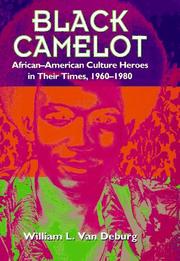| Listing 1 - 3 of 3 |
Sort by
|
Book
ISBN: 1283256770 9786613256775 1571138153 1571133712 Year: 2011 Publisher: Rochester, N.Y. : Camden House,
Abstract | Keywords | Export | Availability | Bookmark
 Loading...
Loading...Choose an application
- Reference Manager
- EndNote
- RefWorks (Direct export to RefWorks)
Fitzgerald's The Great Gatsby is widely seen as the quintessential "great American novel," and the extensive body of criticism on the work bears out its significance in American letters. American Icon traces its reception and its canonical status in American literature, popular culture, and educational experience. It begins by outlining the novel's critical reception from its publication in 1925, to very mixed reviews, through Fitzgerald's death, when it had been virtually forgotten. Next, it examines the posthumous revival of Fitzgerald studies in the 1940s and its intensification by the New Critics in the 1950s, focusing on how and why the novel began to be considered a masterpiece of American literature. It then traces the growth of the "industry" of Gatsby criticism in the ensuing decades, stressing how critics of recent decades have opened up study of the economic, sexual, racial, and historical aspects of the text. The final section discusses the larger-than-life status Gatsby has attained in American education and popular culture, suggesting that it has not only risen from the critical ash heaps into which it was initially discarded, but also that it has become part of the fabric of American culture in a way that few other works have.
American fiction --- History and criticism. --- Fitzgerald, F. Scott --- Geschichte. --- Harbison, John. --- 1920s. --- American Dream. --- American Icon. --- American Literature. --- Cultural Relevance. --- F. Scott Fitzgerald. --- Fitzgerald Studies. --- Gatsby Criticism. --- Jazz Age. --- Literary Criticism. --- Roaring Twenties. --- Robert Beuka. --- The Great Gatsby. --- LITERARY CRITICISM / American / General.
Book
ISBN: 1978816200 1978816170 Year: 2021 Publisher: New Brunswick : Rutgers University Press,
Abstract | Keywords | Export | Availability | Bookmark
 Loading...
Loading...Choose an application
- Reference Manager
- EndNote
- RefWorks (Direct export to RefWorks)
One of the secrets to Bruce Springsteen’s enduring popularity over the past fifty years is the way fans feel a deep personal connection to his work. Yet even as the connection often stays grounded in details from his New Jersey upbringing, Springsteen’s music references a rich array of personalities from John Steinbeck to Amadou Diallo and beyond, inspiring fans to seek out and connect with a whole world’s worth of art, literature, and life stories. In this unique blend of memoir and musical analysis, John Massaro reflects on his experiences as a lifelong fan of The Boss and one of the first professors to design a college course on Springsteen’s work. Focusing on five of the Jersey rocker’s main themes—love, masculinity, sports, politics, and the power of music—he shows how they are represented in Springsteen’s lyrics and shares stories from his own life that powerfully resonate with those lyrics. Meanwhile, paying tribute to Springsteen’s inclusive vision, he draws connections among figures as seemingly disparate as James Joyce, Ta-Nehisi Coates, Thomas Aquinas, Bobby Darin, and Lin-Manuel Miranda. Shades of Springsteen offers a deeply personal take on the musical and cultural legacies of an American icon.
Rock music --- Political aspects --- Bruce Springsteen, New Jersey, music, artist, biography, memoir, Jersey rock, masculinity, American icon, Bruce Springsteen biography, Born in the U.S.A, Patriotism, Nixon, E Street Band, rock music, Rock and Roll, Rock and Roll Hall of Fame, Jersey Shore, Born to Run, working class roots, The Boss, working-class America, Rolling Stone.

ISBN: 9786611430542 1281430544 0226847187 9780226847184 0226847160 0226847179 Year: 1999 Publisher: Chicago, Ill. University of Chicago Press
Abstract | Keywords | Export | Availability | Bookmark
 Loading...
Loading...Choose an application
- Reference Manager
- EndNote
- RefWorks (Direct export to RefWorks)
In the wake of the Kennedy era, a new kind of ethnic hero emerged within African-American popular culture. Uniquely suited to the times, burgeoning pop icons projected the values and beliefs of the Civil Rights and Black Power movements, and reflected both the possibility and the actuality of a rapidly changing American landscape. In Black Camelot, William Van Deburg examines the dynamic rise of these new black champions, the social and historical contexts in which they flourished, and their powerful impact on the African-American community. "Van Deburg manages the enviable feat of writing with flair within a standardized academic framework, covering politics, social issues and entertainment with equal aplomb."-Jonathan Pearl, Jazz Times "[A] fascinating, thorough account of how African-American icons of the 1960's and '70's have changed the course of American history. . . . An in-depth, even-tempered analysis. . . . Van Deburg's witty, lively and always grounded style entertains while it instructs."-Publishers Weekly
African Americans --- Heroes --- Popular culture --- Negritude --- Heroism --- Persons --- Antiheroes --- Apotheosis --- Courage --- Social life and customs. --- History --- Race identity. --- Ethnic identity --- masculinity, blackness, race, heroism, role models, civil rights movement, social change, popular culture, african american, icon, black power, athletes, urban, blues, jazz, soul, musicians, celebrity, fame, notoriety, success, ambition, greatness, arthur ashe, joe lewis, hank aaron, shaft, blaxploitation, ghetto, racism, hollywood, film, dolemite, manhood, gender, virgil tibbs, nonfiction.
| Listing 1 - 3 of 3 |
Sort by
|

 Search
Search Feedback
Feedback About UniCat
About UniCat  Help
Help News
News